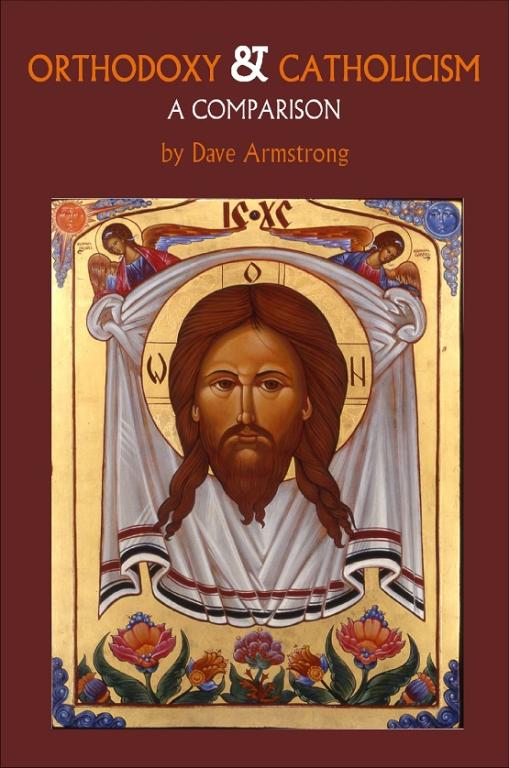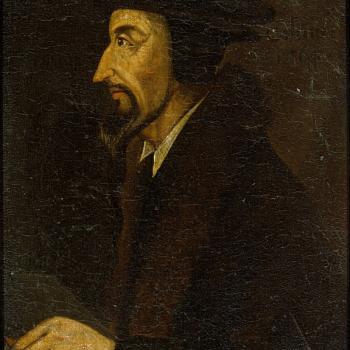(3rd Revised 2015 Edition)
(6-11-14)
The original edition of this volume was completed in July 2004, and was drawn largely from writings, including debates, from the previous seven years online. It has been one of the few books (at least on a lay level or among the apologetics community) to examine Orthodoxy from a Catholic perspective, and has had some degree of influence as such. The Coming Home Network has purchased two large bulk orders and Logos Bible Software included it in its large collection of theological works (with nine other books of mine, as of this writing).
Most notably, in June 2011, I received a letter from His Excellency, Ladislav Hučko: Bishop – Apostolic Exarch of the Greek-Catholic Church, in Prague (Byzantine Rite). He asked for permission to reprint up to 200 copies of my book (already translated into Czech) for his priests and fellow Czech bishops.
There are eight Bohemian bishops in the Czech Republic and five Moravian bishops. The country has eight dioceses and an Apostolic Exarchate. In the Archdiocese of Prague alone there were (in 2011) 378 parishes with 216 priests, serving 370,000 Catholics. It wasn’t clear exactly who was to receive copies of my book, but it appeared to be all the bishops in the Czech Republic and many priests as well. I received no remuneration, but that was rather beside the point.
But to return to the reasons for this revision: in 2004, though I sought to be ecumenical scarcely any less than I do now, I seemed to mostly run across Orthodox online who were of an “anti-Catholic” or “anti-Western” nature, and the book reflected that.
I have become concerned that readers do not come away from this book with a mistaken perception that I am “anti-Orthodox” or that I think most, or the majority of Orthodox Christians are anti-Catholic or anti-Western. I know (from much personal experience) that some – likely, many – of them are. What percentage of the whole are of that mindset, I have no idea. But I know that there are also ecumenical Orthodox.
It has been my strong desire for some time now to revise my book in order to emphasize ecumenism and unity proportionately a lot more than in the first edition. I basically stopped debating theology with the Orthodox around 2001 or so. I only debated on rare occasions when someone strongly challenged some aspect of Catholicism, or when I felt Catholic views were being distorted and had to be defended, as part of my duty as an apologist.
I was much more interested in finding common ground, and that desire and passion has grown in the ensuing years. I’ve also learned a thing or two about Orthodoxy over the past decade. I want my book to reflect that, and to be able to read by Orthodox and also Eastern Catholics, without having seizures or going into apoplectic fits (caused by either my ignorance, or overly polemical or biased writing). I exaggerate, of course, but perhaps not by much!
Toward that end I have enlisted a very qualified Byzantine Catholic friend to participate in the revised edition: Fr. Deacon Daniel G. Dozier. He has immeasurably improved the original manuscript, in a very exciting and insightful way and has made it far more “Eastern-friendly” in a way that I never could have done on my own.
The revision remains an apologetic for Catholicism and respectful critique of Orthodoxy, but now it also includes friendly ecumenical discussion and dialogue: feedback and input from the Eastern Catholic theological perspective. The overall tone and tenor is considerably different.
I first revised it on my own, according to my expressed goals. I remain the final editor, but now, additionally, Fr. Deacon Daniel Dozier contributes his thoughts at the end of each chapter, and I counter-reply: mostly in cases of any disagreement. (sometimes in cases of enthusiastic agreement). In cases where I don’t offer a reply, readers may correctly assume that I am in agreement with my friend’s thoughts. I hope that readers will be able to “resonate with” a genuine, friendly, mutually respectful dialogue. I still believe in it (ever the hopeful idealist).
Fr. Deacon Daniel Dozier also wrote a new chapter at the end of the book, where he discusses matters close to his heart and of concern or importance to him.
The revision has, I think, a different spirit and ultimate goal: to foster unity as well as to defend Catholic views when they are strongly critiqued by the Orthodox.
In participating in the project of revision, I have learned many things, greatly expanded my horizons in the dialogues, and thoroughly enjoyed both the fellowship and additional theological input. My deep hope and prayer is that readers will be blessed and edified by the final product of our combined efforts.
I’m particularly gratified to be able to combine in one book two aspects that are very dear to my heart: respectful dialogue, and a blending of apologetics and ecumenism in such a way that it is clearly seen that the two endeavors are complementary and not contradictory. I believe that Orthodoxy and Catholicism are ultimately harmonious, too, and that is what the deeply hoped-for reunion is all about.
May God greatly bless you, the reader, and I’d like to express my deep, profound thanks and appreciation to Fr. Deacon Daniel G. Dozier for his generous and very educational, edifying, and enlightening participation.
***


















